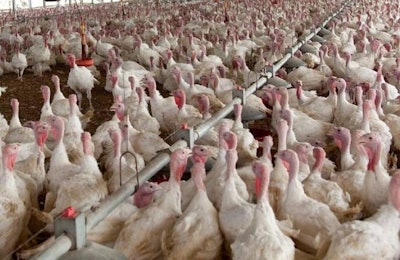
With highly pathogenic avian influenza (HPAI) present in commercial poultry for the first time since early 2016, U.S. poultry associations are calling for increased attention to biosecurity practices in order to prevent disease transmission.
On March 5, the disease was detected in a Tyson Foods Inc. breeder flock in Lincoln County, Tennessee. The company said the incident is isolated to one farm and testing is occurring within a six-mile radius of the farm. On March 6, Wisconsin's Department of Agriculture, Trade and Consumer Protection said a low pathogenic strain of the disease – H5N2 – was detected in a commercial turkey flock in Barron County, Wisconsin.
In a statement, the National Chicken Council (NCC) said the depopulation of the Tennessee farm’s 73,500 birds is already complete. It emphasized that the disease is not foodborne and will not enter the food supply. The Wisconsin farm's 84,000 birds are being quarantined and monitored, but not depopulated. They will only be marketed if found to be free of the disease.
“The U.S. has the most robust monitoring and surveillance programs in the world – and detailed plans are in place and being executed at the federal and state level to control spreading among flocks and eliminate the virus completely, “ Dr. Ashley Peterson, NCC senior vice president of scientific and regulatory affairs, said in a press release.
The industry group is encouraging its members to maintain heightened biosecurity procedures and will work with government and trading partners to minimize disruption to export markets.
Learn more: 6 useful articles for addressing biosecurity
The U.S. Poultry & Egg Association (USPOULTRY) echoed the need for enhanced biosecurity following the detection. It encouraged its members to use the U.S. Department of Agriculture's (USDA) Checklist for Self-Assessment of Enhanced Biosecurity and seek additional information from the USDA Animal and Plant Health Information Service’s website on the topic.
“There is an urgent need for all poultry producers to be vigilant in maintaining biosecurity on farms, particularly wild bird control at this time of year,” Dr. John Glisson, vice president of research programs for USPOULTRY, said in a press release. “The self-assessment tool will help identify any weaknesses on a farm, and numerous resources are identified to address any deficiencies.”
Avian influenza has the potential to devastate commercial poultry operations. The 2014-2015 outbreak in the U.S. rocked the nation’s layer industry, leading to the loss of millions of birds. The scale out the outbreak led to increased scrutiny of biosecurity practices throughout the poultry industry. In a statement, United Egg Producers (UEP) President Chad Gregory said the egg farming community is taking the disease very seriously.
“Clearly, this is of great concern to egg farmers, who recognize the seriousness of this finding and its potential impact on their flocks and on the egg industry,” Gregory said in a press release. “It is a critical reminder that this disease is still a significant risk, and that egg farmers must be vigilant in maintaining strict biosecurity on their farms.”
The UEP statement said egg farmers significantly increased biosecurity measures after the 2014-2015 outbreak. The egg industry association will work closely with the poultry industry to prevent spread of the disease.
Trade disruptions
The confirmed presence of avian influenza in commercial poultry carries the potential to halt some U.S. chicken exports.
According to a March 5 report from Reuters, South Korea – dealing with its own widespread avian influenza outbreak - will ban imports from the U.S. starting March 6. The ban means some US egg exports to the Asian nation will be stopped, as well. The country’s agriculture minister said live poultry and eggs are subject to the ban, while heat-treated chicken meat and egg products can still be imported.
A March 6 report published by Bloomberg and Reuters said Singapore suspended the import of poultry, poultry products, processed eggs and live birds from Lincoln County, Tennessee, and Barron County, Wisconsin. A March 6 report by CNA said Taiwan has banned poultry imports from Tennesse and poultry meat from Wisconsin.


















